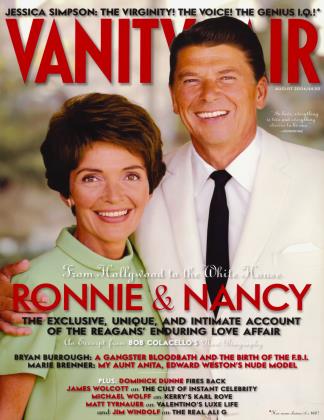Sign In to Your Account
Subscribers have complete access to the archive.
Sign In Not a Subscriber?Join NowBritish comedian-actor Sacha Baron Cohen has become famous as "Ali G," an aspiring gangsta rapper and TV interviewer who confounds the unwitting likes of Ralph Nader, C. Everett Koop, and Donald Trump with his deeply idiotic and offensive questions. Does Da Ali G Show, now starting its second season on HBO, just make fun of its notable guests—who think they're on a U.K. educational youth program—or is it lampooning the stereotypes of a brainwashed culture? The 33-year-old Cambridge graduate behind the subversive hit reveals for the first time his methods and his madness. JIM WINDOLF asks the questions
August 2004 Jim Windolf David BaileyBritish comedian-actor Sacha Baron Cohen has become famous as "Ali G," an aspiring gangsta rapper and TV interviewer who confounds the unwitting likes of Ralph Nader, C. Everett Koop, and Donald Trump with his deeply idiotic and offensive questions. Does Da Ali G Show, now starting its second season on HBO, just make fun of its notable guests—who think they're on a U.K. educational youth program—or is it lampooning the stereotypes of a brainwashed culture? The 33-year-old Cambridge graduate behind the subversive hit reveals for the first time his methods and his madness. JIM WINDOLF asks the questions
August 2004 Jim Windolf David Bailey View Full Issue
View Full Issue






Subscribers have complete access to the archive.
Sign In Not a Subscriber?Join Now